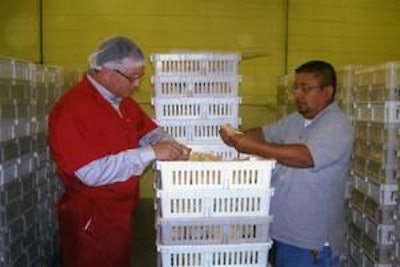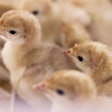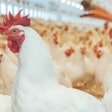
The Midwest Foods Association, founded in 1975 as a buying cooperative, has standardized on the New Shaver white-feathered strain for its 16 members. According to Bruce Lackey, general manager of the MFA, the decision was made on the basis of anticipated performance of the strain which was extensively modified in 2005. Traits which are considered to be of importance to the membership include high egg yield per pullet housed, acceptable shell quality, efficient feed conversion and good livability.
Brickland Hatchery will serve as the production center for both Shaver White and ISA Brown strain hens. Parent stock will be supplied by Hendrix Genetics in Canada. The unit located in Blackstone, Va., has been in operation since the 1940s originally as Clay’s Hatchery and then subsequently under the Brickland name. The facility was mothballed into 2002 due to decreased demand for the strains which were then available. In October 2003, the MFA purchased the hatchery which was extensively renovated, upgraded and expanded.
The hatchery operates under the corporate entity of Midwest Farms LLC. Currently, the company owns and operates two parent breeder farms but has a number of contractors in Virginia and Pennsylvania. Pullet chicks are distributed to all of the MFA members extending from Texas in the South to upper New York State in the North with the bulk of deliveries to Midwest states. Current output is in the region of 12 million pullet chicks per year. The 28 Chick Master multistage setters retrofitted with Genesis™ controls have a capacity for up to 18 million pullets per year.
The Virginia breeding operation and hatchery is under the management of Neal Martin, a VPI graduate and second generation manager of the Brickland facility, following in the footsteps of his father, C. J. Martin. Hatchery manager Luis Soto has been involved in incubation since 1985 and has been affiliated with Brickland since an expansion completed in 1994.
Despite successive additions, the hatchery has a logical and uninterrupted product flow with setters and hatchers in two wings on either side of a central service core. This arrangement allows separate transfer, take off and complete decontamination of the two hatching bays. New facilities under construction include an extensive egg store. Future projects will encompass new biosecurity facilities, workers’ change rooms and other installations contributing to hygiene and efficient operation.
Chick handling includes a carousel for sexing and five Nova-Tech™ modules for beak treatment and subcutaneous vaccination. Separate cabinet vaccinators are available to administer coccidiosis vaccines in addition to aerosol IB/ND vaccines as required by members of the MFA.
Parent farms are serviced by Margaret Coates, a graduate of North Carolina State, with extensive experience in breeder flock management. Both pullet and laying diets fed to parent stock are formulated to exclude animal protein and are supplemented with vitamins and micronutrients to optimize hatchability and chick viability.


















